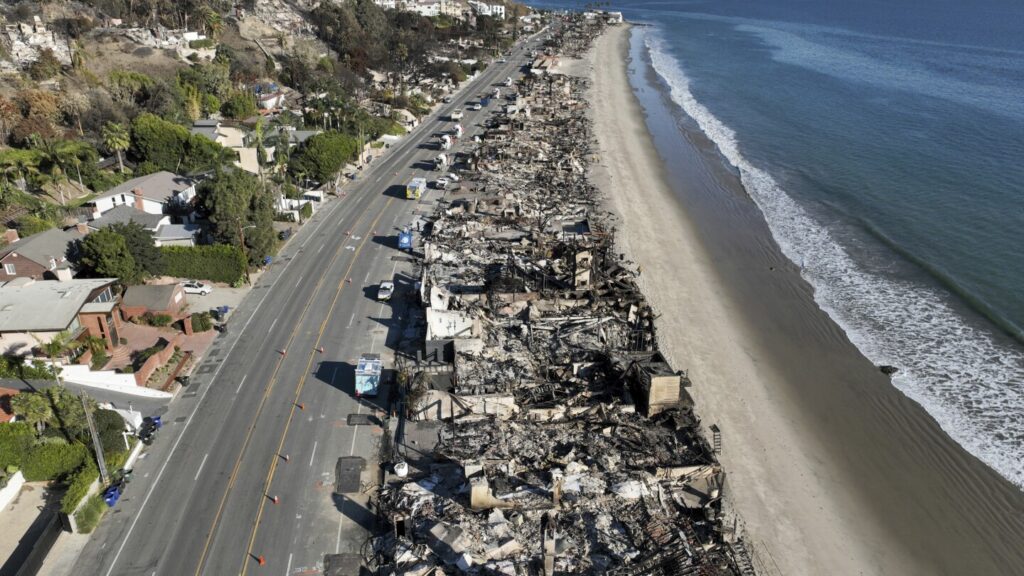SACRAMENTO, Calif. (AP) — A consumer advocacy group filed a lawsuit this week to block insurers from charging California customers for $500 million in costs associated with the deadly Los Angeles fires.
California’s insurance commission in February ordered insurers doing business in California to provide $1 billion to the FAIR Plan, the state’s insurer of last resort, to help it pay out claims related to the LA wildfires. The order allows insurers to recoup half the cost from its policyholders in the form of a one-time fee. The commissioner must approve the costs.
The lawsuit, filed by Consumer Watchdog in Los Angeles, alleges Insurance Commissioner Ricardo Lara overstepped his authority and violated state laws for allowing for such cost shifting without going through the proper process. Such regulations have never been authorized in California and should have been vetted and approved by the Legislature or other oversight agencies before enforcement, Consumer Watchdog argued. The suit is asking the court to block Lara from approving the requests. There were at least three pending applications to implement a surcharge as of Tuesday, according to Consumer Watchdog.
“We look forward to defending the rights and pocketbooks of Californians and stopping this socialization of FAIR Plan losses at the public’s expense, while the FAIR Plan’s profits will wholly remain with the insurance companies,” Consumer Watchdog staff attorney Ryan Mellino said in a statement.
The Department of Insurance said the lawsuit could make California’s insurance crisis worse.
“This hurts homeowners, small business and nonprofits who need access to insurance options, while doing nothing to address the insurance crisis,” Gabriel Sanchez, a department spokesperson, said in a statement. “It also serves to undermine our efforts to restore competition to all areas of our state, so people can get off the FAIR Plan and back to the regular market.”
The FAIR Plan is the state’s last resort option for people who can’t get private insurance because their properties are deemed too risky to insure. The plan, with high premiums and basic coverage, is designed as a temporary option until homeowners can find permanent coverage, but more Californians are relying on it than ever. There were more than 555,000 home policies on the FAIR Plan as of March, more than double the number in 2020.
The plan estimated a loss of roughly $4 billion from the Eaton and Palisades Fires, which sparked Jan. 7, destroyed nearly 17,000 structures and killed at least 30 people. The plan had already paid out more than $914 million as of February.
The lawsuit will not affect the FAIR Plan’s ability to pay out claims, Consumer Watchdog said.
The American Property Casualty Insurance Association, the largest national trade association representing home, auto and business insurers called the lawsuit “a reckless and self-serving stunt.” Insurers have paid ten of billions in claims and contributed more than $500 million to sustain the FAIR Plan after the LA fires, the group said.
“Blocking recovery of the additional costs insurers have paid to prop up the Fair Plan would jeopardize the last-resort coverage option for homeowners — and push our fragile insurance market closer to total collapse,” Denni Ritter, the group’s representative, said in a statement. “It is critical that the costs be spread equitably across a broader pool of insured customers to help restore California’s insurance market and protect access to coverage for all consumers.”
The regulation to allow insurers to shift some of the costs used to sustain the FAIR Plan is among the strategies unveiled by Lara last year. California is undergoing a yearlong effort to stabilize its insurance market after several major insurance companies either paused or restricted new business in the state in 2023, which pushed hundreds of thousands of homeowners onto the FAIR Plan. Wildfires are becoming more common and destructive in California due to climate change, and insurers say that’s making it difficult to truly price the risk on properties.
Of the top 20 most destructive wildfires in state history, 15 have occurred since 2015, according to the California Department of Forestry and Fire Protection.
The state now gives insurers more latitude to raise premiums in exchange for issuing more policies in high-risk areas. That includes regulations allowing insurers to consider climate change when setting their prices and allowing them pass on the costs of reinsurance to California consumers.
Read the full article here


